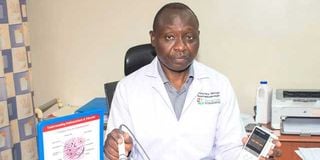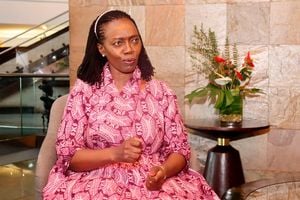Savannah Hospital targets expectant women living with disability

Dr Wachira Murage is an obstetrician/gynaecologist and the Director of the Savannah Hospital in UpperHill, Nairobi.
More than 30 years ago, after completing his studies in medicine and surgery at the University of Nairobi, Dr Wachira Murage joined the Kenyatta National Hospital, where he worked for three years as a medical doctor, before starting his own medical facility in the Nairobi Central Business District.
The facility, dubbed Savannah Hospital, sought to provide various forms of outpatient medical services including comprehensive healthcare, diagnostics and rehabilitative services to both infants and adults. While he was operating the facility, Dr Wachira discovered that there was a huge gap in the provision of obstetrics and gynaecological care, particularly for women living with disabilities, as there were not many specialists catering to this disadvantaged group.
“Many pregnant women living with disabilities face a unique set of challenges that prevent them from receiving quality care. These include lack of access to information on where to access specialised care,” said Murage in an interview with Powering SMEs.
Not only was it difficult for these women to find specialists who would support them through their pregnancy journey, it was also very expensive for them to receive gynaecological care. This was a problem, because some of these women were not able to get medication at critical stages of their pregnancy, whereas others were not able to visit their obstetricians during scheduled appointments.
“Based on my interactions with clients, I noticed that so many pregnant women were unable to receive care at significant stages of their pregnancy, leading to future complications,” said Dr Murage.
This inspired him to, in the year 2000, go back to the university and pursue a masters degree in medicine, obstetrics and gynaecology, that would enable him to venture into gynaecological care.
Financial support
After completing the competency, he opened a larger facility along Mara Road in Upper Hill Nairobi, using his savings and some financial support that he got from partners. Here, they would offer various services in obstetrics and gynaecology, including minimally invasive surgery for fertility treatment, as well as in-patient, theatre and critical care services.
“We had to invest heavily in developing a set up that would compete with the top level hospitals, giving doctors good equipment and support staff to make them feel comfortable. Our location also had to be sizable,” explains the doctor.
So as to effectively reach their target market, they would conduct free online consultations and provide gynaecological care for expectant mothers living with disabilities at subsidised rates. They would also break down their gynaecological and obstetric care services into packages, to make it easier for the expectant mothers and their partners to budget for these services.
“We also partnered with some media stations on panel discussions, to educate the general public on various issues, such as the need to end social stigma regarding pregnant women living with disabilities.”
DNation bodytext: As a result of their approach, the facility quickly gained popularity, receiving referrals from other clients who were satisfied with their work. Ironically though, they found it difficult to meet their overhead costs and also took time to break even.
DNation bodytext: “Since we provide services before we are paid, whether someone is paying through insurance or through cash, most of our income comes through credit. Especially when we were starting out, debt collection was an issue,” explained Dr Murage.
They were also not immune to socio-economic challenges such as the general elections and outbreaks such as the Covid-19 pandemic that greatly disrupted lives and livelihoods.
“During the time that we have been in operation, things have not been easy. Calamities such as the Covid-19 pandemic have occurred that have greatly affected the healthcare industry. We were no exception.”
Despite these setbacks, the facility has been able to expand significantly, directly employing approximately 70 permanent staff and several casuals and indirectly employing suppliers of both medical and non-medical equipment.
Bump n’Brunch
Every year, the hospital runs an initiative dubbed Bump n’Brunch, that brings together pregnant women and their partners to discuss and share their experiences across their pregnancy journeys.
“Through the bump n’ brunch initiative, we host pregnant mothers free of charge to enhance their awareness on matters of reproductive health. This goes a long way to reduce maternal and neonatal morbidity and mortality,” noted Murage.
The hospital runs a foundation called Crotonhealth Foundation that helps in early screening of non-communicable diseases and that runs community outreach and capacity building programs.
“The foundation is also involved in referrals and navigation of patients who have challenges in affording advanced healthcare especially cancer patients,” posed Murage.
In a personal capacity, Dr Murage gives free gynaecological services in a county hospital, where he also runs capacity building programs as chairman of the health management board. Leveraging hospital revenue and the foundation, he seeks to pool funds from partners to finance various projects he hopes to undertake in future.
These include increasing bed capacity in the hospital, expanding services, venturing into the emerging trends in healthcare such as telemedicine, navigation and home-based care, opening other branches and going into community programs where awareness of non-communicable diseases is low for early screening and diagnosis.




